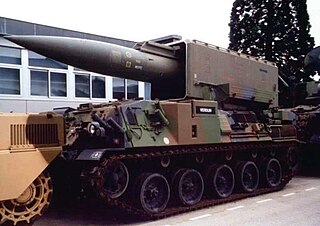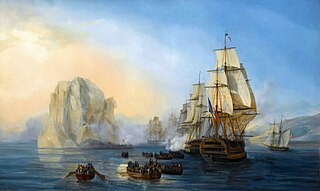
Orpheus in the Underworld and Orpheus in Hell are English names for Orphée aux enfers, a comic opera with music by Jacques Offenbach and words by Hector Crémieux and Ludovic Halévy. It was first performed as a two-act "opéra bouffon" at the Théâtre des Bouffes-Parisiens, Paris, on 21 October 1858, and was extensively revised and expanded in a four-act "opéra féerie" version, presented at the Théâtre de la Gaîté, Paris, on 7 February 1874.
In Greek mythology Styx is a goddess and river of the Underworld, Styx may also refer to:

The Force de dissuasion, known as the Force de frappe prior to 1961, is the French nuclear deterrence force. The Force de dissuasion used to be a triad of air-, sea- and land-based nuclear weapons intended for dissuasion, the French term for deterrence. Following the end of the Cold War, France decommissioned all its land-based nuclear missiles, thus the Force de dissuasion today only incorporates an air- and sea-based arsenal.
Regulus is one of the brightest stars in the night sky.

The Pluton missile was a French nuclear-armed tactical ballistic missile system launched from a transporter erector launcher (TEL) platform mounted on an AMX-30 tank chassis. It was designed to provide the tactical part of French nuclear deterrence during the Cold War.
Eight ships of the French Navy have borne the name Pluton in honour of the Roman god Pluto.

Julien Marie Cosmao-Kerjulien was a French Navy officer, admiral, best remembered for his role in the Battle of Trafalgar.

Pluton was a Téméraire class 74-gun French ship of the line built at Toulon. She was one of two prototypes for a derivative sub-class of the original design; this sub-class was specially intended for construction in some of the shipyards in states occupied by the French, where there was less depth of water than in the main French shipyards. Although the Pluton were built at Toulon, all other vessels of this sub-class were built in these overseas yards, notably at Antwerp but also at Genoa, Trieste, Venice, Amsterdam, Flushing and Rotterdam.
Northern star is a term for the star Polaris and the UK Nuclear Missile Programme. It may also refer to:

The International Astronomical Union (IAU) defined in August 2006 that, in the Solar System, a planet is a celestial body that:
- is in orbit around the Sun,
- has sufficient mass to assume hydrostatic equilibrium, and
- has "cleared the neighbourhood" around its orbit.
Gabriel is a messenger angel or an archangel in the Abrahamic religions.

Suippes is a commune in the Marne department in north-eastern France. It was part of the so-called la Champagne pouilleuse, a region battered by conflict during World War I. In the early months of the war, British soldiers were deployed here and were to march to Châlons-sur-Marne to fight the First Battle of the Marne. In October 1918, the United States also deployed a brigade in the area and was assigned as Fourth French Army reserve. The commune was pillaged and razed by the Germans in the same way they attacked Heiltz-le-Maurupt, Marfaux, Fromentieres, and Esternay.
Plutón was a Furor-class destroyer of the Spanish Navy that fought at the Battle of Santiago de Cuba during the Spanish–American War.

Furor was a Furor-class destroyer of the Spanish Navy that fought at the Battle of Santiago de Cuba during the Spanish–American War.
Pluto is a dwarf planet in the Solar System.

A missile vehicle, also known as a missile carrier, missile truck, or missile launcher vehicle, is a military vehicle that is purpose-built and designed to carry missiles, either for safe transportation or for launching missiles in combat. Missile vehicles include transporter erector launchers (TEL) and multiple rocket launchers (MRL).
This page is based on this
Wikipedia article Text is available under the
CC BY-SA 4.0 license; additional terms may apply.
Images, videos and audio are available under their respective licenses.








